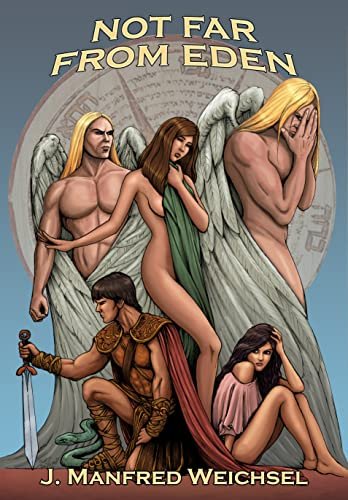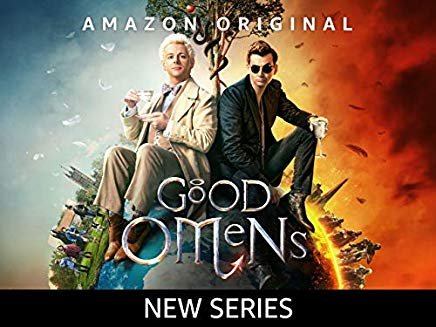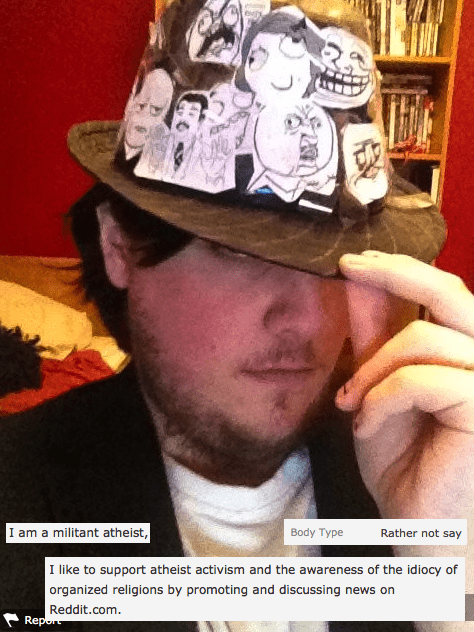Not Far from Eden by J. Manfred Weichsel

Not Far From Eden by J. Manfred Weichsel December 5, 2021
J. Manfred Weichsel has returned with another unbelievable, ridiculous, and over the top satire, Not Far From Eden [Amazon link]. Some of Weichsel’s work, like Jungle Jitters, takes its inspiration from contemporary events. For this book, Weichsel reached back to the Book of Enoch, a bit of Jewish apocalyptic that was likely composed during the time when the Greek successors of Alexander the Great ruled over much of the Middle East.

Even though I haven’t read the Book of Enoch, it is familiar enough, because it has been mined for material by many, many authors of mythic fiction, for example Tim Powers or Neil Gaiman. For the most part, these authors have repurposed the angels or the nephilim featured in the Book of Enoch for their own purposes. Not Weichsel, who has taken it upon himself to retell the Book of Enoch in an entirely modern form.
That’s ambitious, but Weichsel uses his signature style of grotesquerie to translate this earnest religious text into something we moderns can understand. The default mode of storytelling for us is irony and satire. Anything else has a tendency to fall flat:
Sparagmos, or the sense that heroism and effective action are absent, disorganized or foredoomed to defeat, and that confusion and anarchy reign over the world, is the archetypal theme of irony and satire.
…
---When the hero has less power or intelligence than ourselves, so that the scene is one of bondage, absurdity, or frustration, the mode is ironic.
Looking at Northrop Frye’s definition, you can see that “confusion and anarchy reigning over the world” isn’t exactly a foreign theme to the Book of Enoch, which is after all about the destruction and dissolution of man under the influence of fallen angels. But that isn’t the default mode of story.
What Weichsel has done for us is use a modern idiom to make this more accessible to us. For example, lots of contemporary books and movies use sex to gain readers or viewers. An unkind but not inaccurate assessment of Anne Rice’s contribution to the vampire story is that she replaced tragedy with titillation. Weichsel’s book features lots of sex too, but the effect is more unsettling than erotic when the pre-diluvian daughters of Eve take up with fallen angels.

At first, Not For From Eden seems like many other contemporary works, irreverent and edgy. Yet there is a great deal more here than meets the eye. For example, the opening lines of the book sound like the kind of thing an Internet atheist writes to mock the rubes, describing God as an old man with a long white beard, who in subsequent passages is by turns doddering, neglectful, and vengeful. Yet, when you look at the book as whole, what you find is that the only character in the book who was never surprised and had all of his plans come to fruition is the caricature of a deity.
Which has a resemblance with the canon of Scripture, especially the Old Testament, which describes a vast assemblage of people over an enormous span of time, but the protagonist of the story is God Himself, who acts upon history while everyone else is but chaff in the wind. A God who is often described in anthropomorphizing terms that if taken very literally, do not map onto the sophisticated philosophical understanding of a God who is simple and outside of time, but that make for a far better and more comprehensible story.
Ours is not an age that would be able see the acts of God in a straight up act of Providence. However, we just might recognize ourselves in an uncomfortable Gestalt after reading this, and start to wonder about other things.
If you want to know more about Weichsel and his works, check out this interview on the Superversive Livestream.
My other book reviews | Reading Log
Other books by J. Manfred Weichsel
Expedition to Eden Book Review
Ebu Gogo Book Review
Five Maidens on the Pentagram Book Review
Jungle Jitters Book Review
Money Honey Book Review
Tales to Make You Vomit



Comments ()